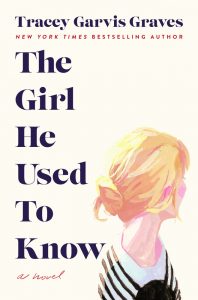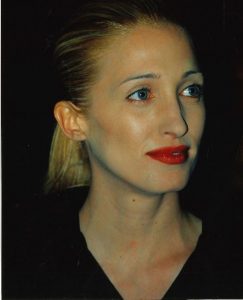
A tender, timeless love story (Chicago 2001, 1991 backstory): Bet you’ll love this pleasure-to-read novel. Sensitive writer, sensitive characters, sensitively rendered romance.
Tracey Garvis Graves dedicates her new novel to “anyone who’s felt like they didn’t belong.” She could have also dedicated it to everyone who’s wished for a second chance, be it love or otherwise. The Girl He Used to Know encompasses both.
Great title. Another, less catchy, could have been The Woman She’s Become. On page 4, the protagonist, Annika, expresses the dual narratives of Then and Now: a “desire to replace the memories of the girl he used to know with the woman I’ve become.”
Structured so we can compare these two Annika’s – the more confident one the novel opens with in 2001 when she’s in her thirties, to her 1991 twenties-self attending the University of Illinois at Urbana-Champaign, a few hours outside of Chicago where she now lives. Over this ten-year span we see how Annika has changed, developmentally and socially, though some parts of her haven’t changed much. Not because she still has a neurological condition and is still head-turning beautiful. But because she’s stayed real and beautiful on the inside.

By John Mathew Smith & www.celebrity-photos.com [CC BY-SA 2.0], via Wikimedia Commons
Annika Rose has an exotic name that matches her “stark beauty.” Sharp cheekbones, big blue eyes, blond hair “almost white,” modeled on another gorgeous soul: Carolyn Bessette-Kennedy, who shockingly perished in a plane crash in 1999 along with her sister and husband, beloved by all, John F. Kennedy Jr.
If you know anyone diagnosed as high-functioning on the autism spectrum, you’ll recognize Annika. Forget labels, stereotyping. Rather, it’s how Graves shows and tells us what it feels like to be Annika, giving her characteristic traits yet shaping her not comically as other novels have done but deeper, compassionately.
Annika is the vulnerable star of this literary show. Two other characters are her stellar supporting cast: Janice and Jonathan, who accepted her in college, made her feel for the first time in her life she did belong, watched her back, loved her. We could all use a Janice and a Jonathan in our lives. One a blessing; two miraculous for a girl who felt “all my life I’ve been an embarrassment to myself.”
The formula for why the novel sings: pitch-perfect dialogue; Annika’s refreshing honesty; Annika’s learning the importance of accepting herself; the extent true love can go; and smart, informed writing that briskly alternates between two narrators’ perspectives (Annika’s voice and Jonathan’s) from two time perspectives.
If it weren’t for Janice, the best roommate in the world, Annika was paired up with freshman year, Annika probably would have dropped out by the end of the first week, since she almost did. Janice’s perceptiveness and kindness saved Annika, steering her to two things she loved most: chess and animals.
Chess club led Annika to Jonathan, assigned to play chess with her during senior year. Chess and volunteering at an animal clinic sustained her; environments where she could block out the noise in her head brought on by overwhelming social anxieties. Chess was a place she felt “I almost fit in”; animals needed her and gave unconditional love. The victim of bullying (home-schooled by seventh grade), no surprise she “simply preferred the company of animals over most humans.”
On page 10, Annika tells us “her brain does not work like other people’s. I think in black-and-white. Concrete. Not abstract.” Literal thinking interferes with understanding the nuances and unspoken meanings of social cues, norms. Back then, Janice and Jonathan helped her navigate. Now Janice lives in New Jersey, married and the mother of a young child (still Annika’s best friend), while Annika and Jonathan haven’t connected since graduation. That’s when he moved to NYC for an investment banking job; she promised to follow him there but didn’t. To work through losing the person who was her “everything,” Annika now has a therapist named Tina talking her through putting oneself in someone else’s shoes. Had she been able to do that with Jonathan back then, maybe things would have turned out differently.
Had he continued to put her needs over his perhaps they’d have stayed together, since “no one had loved me as fiercely and unconditionally as she did,” says Jonathan.
Jonathan made the wrong assumptions. Through a couple of twists of fate we don’t see coming – particularly towards the gripping ending – Graves makes sure we get her message about making assumptions.
The opening scene resonates. What would you do if you bumped into your first love, your one and only love? Annika assumed Jonathan was still living in New York, so what’s he doing in Chicago? Caught off guard, yet she’s been preparing for a moment like this, a second chance.
The burning question is whether Jonathan wants that too. Does he still care enough to be willing to push aside hurt/angry feelings after Annika failed to show up? Coming off of a painful divorce, is he still up for “peeling back Annika’s layers”? Ready for another serious relationship?
One thing that might help Jonathan is to see the progress Annika has made. Will he be struck by her bold move to a large city for someone extremely stressed by crowds? Will he note something must have changed now that she tells him she’s working in a busy setting – the main branch of the Chicago Public Library (books always a solace)?
If that doesn’t catch his attention, what does is she’s no longer dressed in long skirts two sizes larger for her “perfectly proportioned body,” so she couldn’t feel the texture of fabric touching her skin. Some sensations unnerved her, especially the sensation of someone touching her. Jonathan was the only person whose touch didn’t jar her. “His touch grounded me and made me feel like nothing bad could ever happen.” Today the woman he meets is dressed to accentuate her femininity. Will he desire to touch her again, intimately?
Annika used to be someone who couldn’t bear people entering her “personal space.” Sound familiar? The novel drops us right into the Me Too era.
Jonathan was initially attracted to Annika’s beauty, but once he appreciates the ease he feels around her, she becomes “much more than a pretty face.” What does that say about getting to know people with disabilities who might not be as physically attractive?
Annika’s conversation used to be simplistic, straightforward, as she didn’t have any filters or experience with men. “Do you want to kiss me”? “Were you flirting with me?” she innocently asks, to which Jonathan charmingly responds: “I was trying to. I thought I was halfway decent about it, but now I’m not so sure.”
Gentle and patient, he teaches Annika how to make love, assuring her he’d never hurt her. Ironically, she hurt him.
Back then it was impossible for Annika to gaze into someone’s eyes, even Jonathan’s. If he and we could see her now: also working with children, interestingly teaching them how to act (in theater) and playwriting, we imagine her smiling and looking straight at them. They love and accept her for the authentic, loving person she is. (She also continues to care for animals.)
Learning to accept others, see their gifts. Be real, honest. Be kind to and look out for others. Why is this so hard for us to do in 2019? An extraordinary love story with implications for all.
Lorraine
Pingback: Heard It in a Love Song ← Enchanted Prose
Pingback: The Trail of Lost Hearts ← Enchanted Prose